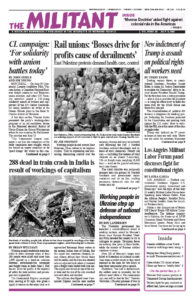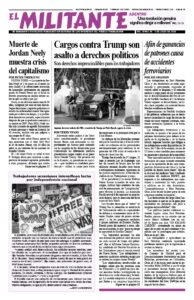The Ukrainian government has launched a counteroffensive aimed at retaking territory seized by Moscow’s forces since Russian President Vladimir Putin invaded the country to try to subjugate its people. Ukrainian forces are making slow gains in fierce battles, while the morale of Russian soldiers continues to wane.
Over 100 of Moscow’s troops were killed at Kreminna in Luhansk in mid-June when a rocket struck as they stood exposed in the open for two hours to hear their commander give a speech.
Elsewhere, “our unit is demoralized, the soldiers want to surrender, but the officers won’t allow it. The commander says you will be shot for that,” Yaroslav Yerovslav, a Russian prisoner of war in Ukraine, was quoted by the Kyiv Post June 14. “That’s why all the soldiers in our unit are drinking … this is all the result of the ambition of one person” — Putin.
Russian POW Anton told the Wall Street Journal, “What I’m starting to realize is that in this war, we’re not on the side of right.” Another POW said he did not want to be returned home in a prisoner swap.
The Kremlin is stepping up repression against political opponents in Russia, but has been unable to quash labor actions. In the Ural region, up to 150 striking miners refused to return to the surface at the Mariinsky emerald mine June 6, protesting the bosses’ threats of mass layoffs. The miners demanded to speak to Putin, since the mine is run by Rostec, headed by Sergei Chemezov, a close Putin associate.
In May, workers at the Ulyanovsk Automobile Plant went on strike. Instead of 45,000 rubles ($540) per month, the workers got only 20,000 rubles. Officials promised to investigate. Seven workers were detained by cops who alleged they were “sabotaging” a defense order by going on strike.
Anti-war activist Anatoly Berezikov died in police custody in Rostov-on-Don, southern Russia, June 14. He had been detained in May for distributing leaflets advertising a hotline for Russian soldiers seeking to surrender to Ukrainian armed forces. Cops had tortured and threatened to kill Berezikov. Prison officials claimed he had committed suicide.
That same day Lilia Chanysheva was jailed for seven and a half years for “creating an extremist organization,” the latest in a series of prison terms for Putin’s opponents. Chanysheva is a member of the banned Anti-Corruption Foundation, headed by a bourgeois opponent of Putin, Alexei Navalny, who is also in prison. “Putin has long wanted to eradicate any dissent,” she told the court. He is “synonymous with war!”
The Kremlin has also put on trial 20 captured Ukrainian prisoners of war who are members of the Azov brigade. The Russian government accuses them of “terrorism” for their heroic defense of the besieged city of Mariupol last year, and of trying to “overthrow” the puppet regime that Putin imposed in the Donetsk region of Ukraine.
On June 4, thousands of Russian emigres in over 100 cities worldwide protested to demand freedom for political prisoners. In Yerevan, Armenia and Tbilisi, Georgia, demonstrators chanted, “Freedom to Navalny” and “No to war!” At least 113 people were detained across Russia for protesting the same day.
The Kremlin is on a recruitment drive to bolster its depleted forces, hoping not to have to launch another round of conscription that it fears would set off wider protests. State corporations, from the energy giant Gazprom to the space agency Roscosmos, are trying to organize militias to boost Moscow’s forces.
The feud by Yevgeny Prigozhin, the chief of Wagner mercenaries used heavily by Moscow in many of its most deadly assaults, continues against the Kremlin’s high command. Prigozhin disputed claims by Putin and others that Ukraine’s counteroffensive had fizzled at great cost to its forces. Ukrainian forces, he said, had suffered “ordinary combat losses” in recapturing over 40 square miles. Prigozhin demands the Russian government institute a much wider conscription drive and impose martial law, a course that would be even more disastrous for working people than that advanced by Putin.
Dam blast causes major flooding
An explosion ruptured the wall of the huge Russian-held Nova Kakhovka Dam, in southern Ukraine, June 6. Water burst from Ukraine’s largest reservoir to flood the Dnipro River, a front line in the conflict, upstream from recently liberated Kherson. Tens of thousands of residents in low-lying areas in both Ukrainian- and Russian-occupied areas were forced to flee.
In a blow to thousands of workers in the large industrial city of Kryvyi Rih, the draining of the reservoir forced the giant ArcelorMittal steel plant there to halt production. Water to cool the Russian-controlled Zaporizhzhia nuclear power plant has been reduced, endangering safety. Ukrainian farmland was heavily eroded or waterlogged, while falling reservoir levels have impacted irrigation systems farmers depend on.
Kyiv said Moscow blew up the dam from within to slow down its counteroffensive. Without any evidence, Moscow tried to blame Ukrainian shelling.

